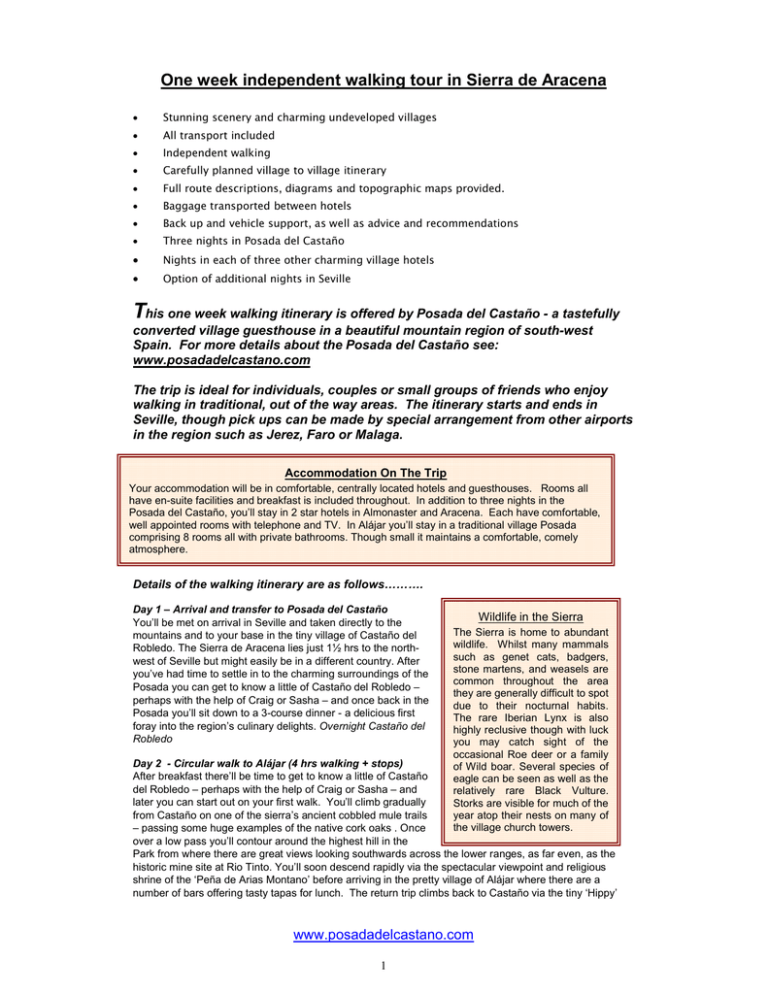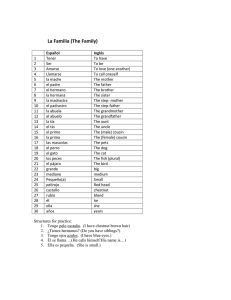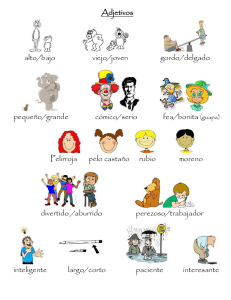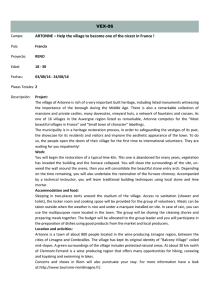One week independent walking tour in Sierra de Aracena
Anuncio

One week independent walking tour in Sierra de Aracena Stunning scenery and charming undeveloped villages All transport included Independent walking Carefully planned village to village itinerary Full route descriptions, diagrams and topographic maps provided. Baggage transported between hotels Back up and vehicle support, as well as advice and recommendations Three nights in Posada del Castaño Nights in each of three other charming village hotels Option of additional nights in Seville T his one week walking itinerary is offered by Posada del Castaño - a tastefully converted village guesthouse in a beautiful mountain region of south-west Spain. For more details about the Posada del Castaño see: www.posadadelcastano.com The trip is ideal for individuals, couples or small groups of friends who enjoy walking in traditional, out of the way areas. The itinerary starts and ends in Seville, though pick ups can be made by special arrangement from other airports in the region such as Jerez, Faro or Malaga. Accommodation On The Trip Your accommodation will be in comfortable, centrally located hotels and guesthouses. Rooms all have en-suite facilities and breakfast is included throughout. In addition to three nights in the Posada del Castaño, you’ll stay in 2 star hotels in Almonaster and Aracena. Each have comfortable, well appointed rooms with telephone and TV. In Alájar you’ll stay in a traditional village Posada comprising 8 rooms all with private bathrooms. Though small it maintains a comfortable, comely atmosphere. Details of the walking itinerary are as follows………. Day 1 – Arrival and transfer to Posada del Castaño You’ll be met on arrival in Seville and taken directly to the mountains and to your base in the tiny village of Castaño del Robledo. The Sierra de Aracena lies just 1½ hrs to the northwest of Seville but might easily be in a different country. After you’ve had time to settle in to the charming surroundings of the Posada you can get to know a little of Castaño del Robledo – perhaps with the help of Craig or Sasha – and once back in the Posada you’ll sit down to a 3-course dinner - a delicious first foray into the region’s culinary delights. Overnight Castaño del Robledo Wildlife in the Sierra The Sierra is home to abundant wildlife. Whilst many mammals such as genet cats, badgers, stone martens, and weasels are common throughout the area they are generally difficult to spot due to their nocturnal habits. The rare Iberian Lynx is also highly reclusive though with luck you may catch sight of the occasional Roe deer or a family of Wild boar. Several species of eagle can be seen as well as the relatively rare Black Vulture. Storks are visible for much of the year atop their nests on many of the village church towers. Day 2 - Circular walk to Alájar (4 hrs walking + stops) After breakfast there’ll be time to get to know a little of Castaño del Robledo – perhaps with the help of Craig or Sasha – and later you can start out on your first walk. You’ll climb gradually from Castaño on one of the sierra’s ancient cobbled mule trails – passing some huge examples of the native cork oaks . Once over a low pass you’ll contour around the highest hill in the Park from where there are great views looking southwards across the lower ranges, as far even, as the historic mine site at Rio Tinto. You’ll soon descend rapidly via the spectacular viewpoint and religious shrine of the ‘Peña de Arias Montano’ before arriving in the pretty village of Alájar where there are a number of bars offering tasty tapas for lunch. The return trip climbs back to Castaño via the tiny ‘Hippy’ www.posadadelcastano.com 1 Trees Within The Natural Park Holm Oaks (or Evergreen Oaks) are the predominant species throughout the Natural Park. Even on private land it’s forbidden to cut these down. Cork Oaks are also prevalent and their bark is harvested roughly every 9 years for its cork. At higher altitudes, such as around Castaño del Robledo, Chestnut trees are cultivated for their precious nuts and Pear and Walnut are common. Lower down in valleys such as that of Alájar you’re more likely to find Olive, Almond, Orange and Lemon. In more recent times some hillsides have been planted with Pine or Eucalyptus to prevent soil erosion. village of El Calabacino. Later, your route follows the ancient trail through the valley of the Rio Jabugo, climbing the last 2 kms steadily back to ‘El Castaño’ where you can watch the sun go down from the terrace of the Posada, or from one of the two tiny bars on the plaza. Overnight Castaño del Robledo Day 3 - Circular walk to Valdelarco (4½hrs walking + stops) Today, after breakfast in the Posada, there’s a short 10 min taxi ride to the tiny village of Navahermosa where you’ll begin today’s walk. You’ll follow the road out the village before turning onto the path that follows a stream through the narrow Talenque valley, home to numerous hawfinches and warblers. Later you’ll emerge into a startling landscape of steep gorges and wide valleys wherein we find the pretty village of Valdelarco whose time-worn cobbled streets are well worth taking some time to wander. Towards the bottom of the village you’ll find two welcoming little tapas bars from which to choose - each with a delightful internal patio to enjoy the sunshine and the local delicacies of fish or pork. If it’s too early for lunch then there are more tapas options in Galaroza. Leaving Valdelarco the landscape changes yet again such that you find yourself descending rocky paths across hillsides of cork trees to this latter village. From here the route follows the ancient trail through the valley of the Rio Jabugo, climbing the last 2 kms steadily back to ‘El Castaño’ where you’ll be ready to relax and enjoy your last evening at the Posada. Overnight Castaño del Robledo. How Tough Is The Walking? Ascents/descents: Whilst the walks on this itinerary are almost never on the flat, the rolling nature of the Aracena range is such that steep climbs and descents are few. The longest single sustained climb is around 500m along the dirt track ascending the peak of Cerro San Cristobal, but even this climb is optional, with another alternative route around the hill given in your route notes. The maximum cumulative ascent/descent on any given day is around 350m vertical. Terrain: Mostly you’ll be walking on broad dirt tracks, old cobbled mule trails or narrower footpaths. Dirt tracks make for easy walking and involve little effort in placing your feet. The cobbled trails vary in their state of repair from level stone flags with well defined steps, to uneven jumbles of large boulders. Footpaths can be rocky and have loose stones underfoot but are generally easy to follow and have firm footing. Very occasionally footpaths may be ill defined for short distances or, depending on the time of year, may have some vegetation (like brambles) over-hanging the trail in a few places. Your route notes however, will keep you on the right path on such occasions. Obstacles: The routes used on this itinerary avoid the need to climb any fences or walls. The majority of the paths used are designated walking routes within the Natural Park and have been waymarked. There are small footbridges over most water courses but on around three or four occasions you will have to cross streams using stepping stones. There are many simple wire gates which you will be required to open and then close again by re-slipping a wire ring around gatepost and fencepost. In general this itinerary is well within the capability of anyone who takes reasonably regular walks in the UK countryside. It requires no special skills – just a little bit of stamina to keep you going for 5 consecutive days! Day 4 - Castaño del Robledo to Almonaster (5 hrs walking + stops) Today’s walk is a delightful route crossing hills to the historic village of Almonaster La Real. At first you’ll climb out of the bowl of hills which surround Castaño del Robledo, then traverse a long ridge with distant th views wetwards to the villages of Jabugo and Cortegana with its 13 century castle outlined against the horizon. Slightly to the south of this is the high peak of the Sierra’s 2nd highest mountain – Cerro San Cristobal. Your route leads over this peak affording you spectacular views back to Castaño and several other villages around the Sierra. Along the way you’ll see stone walled enclosures full of the prized Iberian black pigs whose delicious cured hams are famous throughout all Spain. Once on the top you’ll descend (partly on ancient Roman cobbles) to the picturesque village of Almonaster, all the while enjoying th marvellous views over the village with it’s dramatic 9 century hilltop mosque set against a backdrop of yet more peaks and valleys stretching to the distance. Once in Almonaster, you’ll head straight to your hotel in the centre of the village where you’ll find your bags awaiting you in your room. In the afternoon a visit to the mezquita is a ‘must’. Although tiny, this architectural gem exudes a peaceful aura of contemplative calm with its delicate double horse-shoe arches and burbling fountain.. Overnight Almonaster. www.posadadelcastano.com 2 Day 5 - Almonaster to Alájar (5 hrs walking + stops) This is a beautiful and fairly gentle day following the southern flank of the Sierra’s main range. You’ll set out following old trails through wooded valleys of Cork and Holm Oak and pass through two tiny hamlets before arriving in Santa Ana – a large sleepy village where you can stop for lunch or a drink. From there you’re route continues through the valley of the Alájar River, a wondrously fertile area where you’re sure to meet locals on the trail heading to tend their precious allotments of potatoes, beans, peppers or tomatoes. Along the riverside are several interesting old mills which, in their day, ground wheat for the Sierra’s bread. At the end of the walk you’ll arrive in the charming white village of Alájar set neatly in the bottom of a steep sided valley from where the imposing shrine of Arias Montano towers dramatically above. Overnight Alájar. Almonaster’s Mezquita The imposing castle and mosque which dominates Almonaster has rightfully set the village apart as one of the most visually dramatic in the region. The superbly well preserved mosque is truly ancient with many of the materials used in the Moorish construction coming from earlier Roman and Visigoth buildings on the same site. Uniquely, the original Moorish mosque remains whilst other similar ones were built over or destroyed by the reconquering Christians. The mihrab - the ornate alcove indicating the direction of Mecca - is easily the oldest in the entire Iberian peninsula having been th built around the end of the 9 century. Day 6 - Alájar to Aracena (4 hrs walking + stops) The last day’s walk is slightly shorter than most allowing you plenty of time in the afternoon to explore Aracena’s many wonderful attractions. Heading out from Alájar the trail climbs though cork groves and pastures of Iberian black pigs to the abandoned hamlet of Los Madroñeros. From here the trail crosses a low pass amidst marvellous scenery then descends to the picturesque village of Linares. Approaching the village you’ll pass through orchards of orange, quince and pomegranate, before crossing a small stone bridge over the Linares river and into the streets of the village itself. The twist and turn of every tiny street is picture postcard stuff and you’ll want to rest a moment or two within earshot of one of the many peaceful fountains or, perhaps have a drink at the little bar inside the village bullring. A further two hours brings you to the region’s main market town of Aracena where, after checking into your centrally located hotel, you’ll have time to visit the ‘Caves of the Marvels’ - one of the largest cave systems in Spain at over 2km long. Its 12 caverns include 6 underground lakes and an attractive display of stalactites, stalagmites and columns together with many other limestone deposition features. The castle hill is also well worth a visit with its th magnificent 13 century Knights Templar church and ruined castle. It also has magnificent views over the town and surrounding country. Overnight Aracena Day 7 - Seville After breakfast a short drive brings you to the neighbouring village of Fuenteheridos where you’ll board a comfortable air-conditioned coach to Seville. As there are two buses per day you can choose to arrive in Seville at 09.05 or 18.20 (Sun; 12.00 or 18.35). The tour ends at the bus station in Seville where luggage lockers available. You’re then free to enjoy the city’s marvellous atmosphere and many historic attractions before continuing your onward travel. NB: If you wish to add a night in Seville at the beginning or the end of your itinerary we will be happy to make a hotel reservation on your behalf. Not Included in the trip Included in the trip All transport from/to Seville Local transport in the sierra Accommodation throughout the trip Baggage transfers between hotels Breakfast throughout the trip One evening meal (on first night) Route notes, diagrams and topographic maps Flights to/from Seville Lunches Most evening meals Entrance fees to monuments and museums Airport taxes Accommodation in Seville Transfer from city centre to airport www.posadadelcastano.com 3 Eating in the Sierra de Aracena Lunchtime Tapas: Andalucía is the traditional home of the ‘tapa’ and the Sierra de Aracena is no exception. These delicious bar snacks make the ideal lunch and are a fantastic means of savouring the local culture and cuisine as you make your way around the countryside from one village to the next. Virtually all of the villages on your route have at least a couple of small bars with a selection of tapas – all of them tasty, wholesome and mostly home-made. Posada del Castaño will provide you with a basic glossary of tapas and even menu translations of some of the more highly recommended bars. The menus are varied but standard classics include: setas al ajillo - mushrooms baked with garlic; carne en salsa - tender chunks of pork in a rich tomato sauce; tortilla española - omelette stuffed with potato; patatas bravas - fried potatoes with a spicy red sauce; presa, lomo and secreto different cuts of fresh pork served grilled or fried; sardinas - a deep fried sardine or two; garbanzos con espinaca - a savoury stew of chick peas and spinach, boquerones - a little pile of deep-fried anchovies; The list is endless and mouth-watering... If you can’t resist, and want larger quantities, ordering a ración (portion) of any of the tapas will produce an ample plateful - so constructing a varied meal couldn’t be easier. Two or three tapas and a lunchtime drink in the village plaza will set you up nicely and should cost you no more than the equivalent of around 6 or 7 pounds sterling per person. Alternatively if you prefer to lunch on the trail beneath a cork tree you can simply pop in to the local grocers before you set off and choose from a fine array of cheeses, spicy chorizo sausages, hams, olives, fruit, nuts and fresh bread, etc. Evening meals: Spaniards dine late and most restaurants only begin serving around 8.30 or 9.00pm. You’d most likely eat alone at this hour however, as peak dining time is between 10pm and 11pm. In each of the villages where you stay there are at least two or three good restaurants and, in the case of Aracena and Alájar, several more again. You’ll be given recommendations for where to dine in each village and if you really don’t feel like wandering too far in the evening, then its possible to eat in each of the hotels where you stay - the only exception to this being the Posada del Castaño. A three course dinner with wine in a medium range restaurant in the Sierra will cost the equivalent of around 20 pounds sterling per person. Other less expensive options are also available. Rates: The price for the trip in 2012 is 469 euros per person based on minimum two people who share a room. There is a single supplement of 50 Euros for those requiring a single room throughout the trip. Bookings can be made for any dates (subject to availability) and individuals, couples or groups of up to 16 people can be accommodated. Group discounts apply for 5 or more people - the bigger the group the bigger the discount. Please contact Posada del Castaño for details. Posada del Castaño Calle José Sanchez Calvo, 33 Castaño del Robledo 21292 Huelva SPAIN Telephone: ++34 959 465502 Email: info@posadadelcastano.com www.posadadelcastano.com 4





